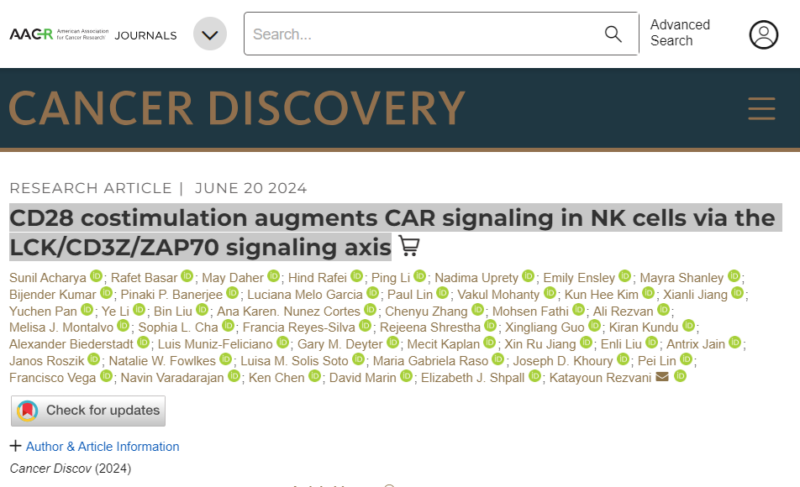CAR NK cells with CD28 costimulation improved cell persistence and antitumor activity
Adding CD28 costimulation to cord blood-derived chimeric antigen receptor (CAR) natural killer (NK) cells targeting CD70+ cancers significantly enhanced antitumor efficacy and long-term cytotoxicity of the CAR NK cells, according to researchers from The University of Texas MD Anderson Cancer Center.
The findings, published today in Cancer Discovery, demonstrate that the addition of CD28, a T cell centric costimulatory molecule that is normally absent in mature NK cells, can enhance CAR NK function in preclinical models of hematologic cancers and solid tumor malignancies, suggesting this engineering approach should be considered for future NK cell therapies.
“Based on the innate anti-tumor activity of NK cells against cancer and the potential of CD70 as a target antigen, CD70-targeting CAR NK cells hold significant promise as effective treatment for many solid tumors. After exploring multiple costimulatory molecules, we found that adding CD28 was a worthwhile approach to improving the cells’ persistence and efficacy, suggesting the potential for strong outcomes,”said senior author Katy Rezvani, professor of Stem Cell Transplantation and Cellular Therapy.

CD70 expression has been shown to contribute to tumor progression and immune evasion, making it an ideal target for CAR NK cell therapy. Therefore, researchers led by Sunil Acharya, principal research scientist in the Rezvani lab, sought to engineer and optimize CD70-targeting CAR NK cells for use as cancer cell therapies.
To accomplish this, they incorporated CD27, the natural receptor for CD70, into the CAR NK cells to bind CD70+ cancer cells. They also evaluated various costimulatory molecules, including CD28, paired with CD3ζ to enhance CAR NK cell activity. Finally, the cells also included IL-15 to improve NK cell persistence and iC9 as a safety switch, based on previous research findings.
The CAR NK cells with CD28 demonstrated high cytotoxicity against CD70+ tumor cells in vitro and in multiple tumor models of hematologic and solid tumors. CD28 consistently emerged as one of the top costimulatory molecules tested. After a closer look, the researchers discovered that CD28 activates key signaling pathways involving LCK, CD3ζ and ZAP70 in the CAR NK cells to enhance their anti-tumor activity.
Based on these results, researchers at MD Anderson have initiated first-in-human Phase I/II clinical studies to assess the safety and efficacy of CAR27 NK cells with C28 in patients with CD70+ hematologic malignancies and solid cancers.
CD28 costimulation augments CAR signaling in NK cells via the LCK/CD3Z/ZAP70 signaling axis
Authors: Sunil Acharya, Rafet Basar, May Daher, Hind Rafei, Ping Li, Nadima Uprety, Emily Ensley, Mayra Shanley, Bijender Kumar, Pinaki P. Banerjee, Luciana Melo Garcia, Paul Lin, Vakul Mohanty, Kun Hee Kim, Xianli Jiang, Yuchen Pan, Ye Li, Bin Liu, Ana Karen. Nunez Cortes, Chenyu Zhang, Mohsen Fathi, Ali Rezvan, Melisa J. Montalvo, Sophia L. Cha, Francia Reyes-Silva, Rejeena Shrestha, Xingliang Guo, Kiran Kundu, Alexander Biederstadt, Luis Muniz-Feliciano, Gary M. Deyter, Mecit Kaplan, Xin Ru Jiang, Enli Liu, Antrix Jain, Janos Roszik, Natalie W. Fowlkes, Luisa M. Solis Soto, Maria Gabriela Raso, Joseph D. Khoury, Pei Lin, Francisco Vega, Navin Varadarajan, Ken Chen, David Marin, Elizabeth J. Shpall and Katayoun Rezvani.

Other posts featuring MD Anderson Cancer Center.
-
Challenging the Status Quo in Colorectal Cancer 2024
December 6-8, 2024
-
ESMO 2024 Congress
September 13-17, 2024
-
ASCO Annual Meeting
May 30 - June 4, 2024
-
Yvonne Award 2024
May 31, 2024
-
OncoThon 2024, Online
Feb. 15, 2024
-
Global Summit on War & Cancer 2023, Online
Dec. 14-16, 2023
